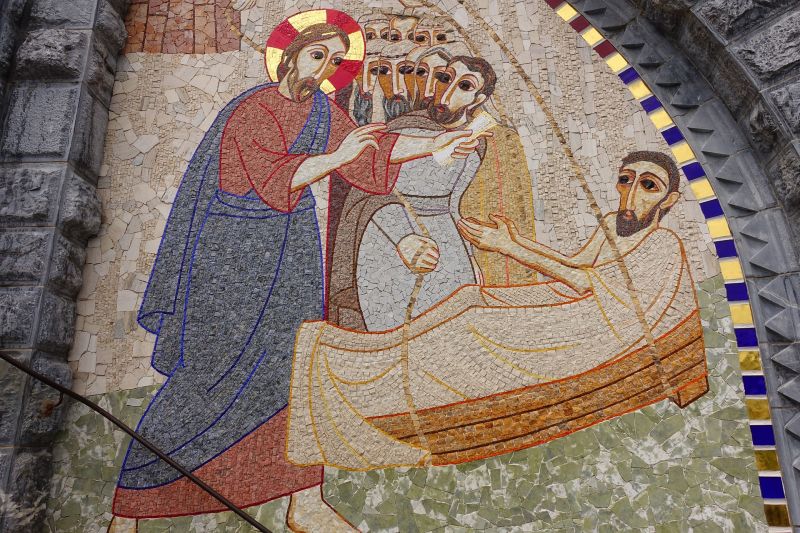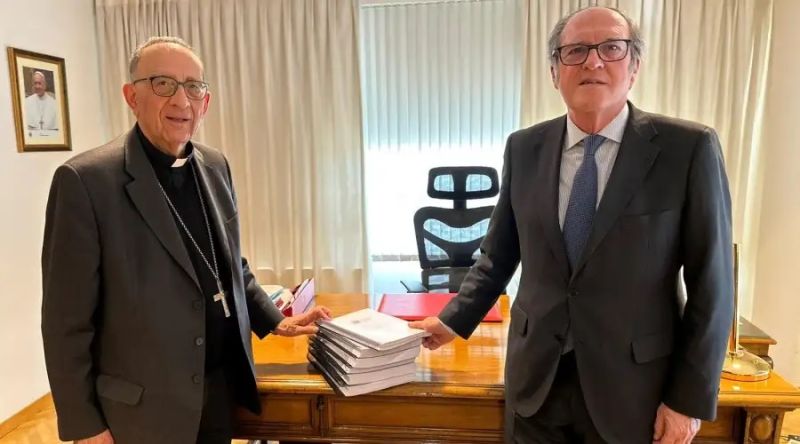 Bishop Erik Varden O.C.S.O, of the Catholic Territorial Prelature of Trondheim, Norway, at the vespers at Santa Maria dell’Anima in Rome. / Daniel Ibáñez / CNA
Bishop Erik Varden O.C.S.O, of the Catholic Territorial Prelature of Trondheim, Norway, at the vespers at Santa Maria dell’Anima in Rome. / Daniel Ibáñez / CNA
Rome Newsroom, Mar 25, 2023 / 14:40 pm (CNA).
Bishops from the five Nordic countries have released a letter on the traditional Christian teaching on sexuality, upholding the “embodied integrity of personhood” against modern transgender ideologies.
“Now, notions of what it is to be a human, and so a sexual being, are in flux. What is taken for granted today may be rejected tomorrow. Anyone who stakes much on passing theories risks being terribly hurt. We need deep roots,” the eight members of the Nordic bishops’ conference say in the letter, which was released Saturday.
“Let us, then, try to appropriate the fundamental principles of Christian anthropology while reaching out in friendship, with respect, to those who feel estranged by them,” they continue. “We owe it to the Lord, to ourselves, and to our world, to give an account of what we believe, and of why we believe it to be true.”
The pastoral letter is being read aloud at Masses this weekend at Catholic churches in Sweden, Norway, Finland, Denmark, and Iceland. EWTN Norway provided CNA with a copy of the letter.
Cardinal Anders Arborelius, the bishop of Stockholm, Sweden, is among the document’s eight signers.
The others are: from Norway, Bishop Erik Varden of Trondheim, Bishop Berislav Grgić of Tromsø, and Bishop Bernt Eidsvig of Oslo; from Denmark, Bishop Czeslaw Kozon of Copenhagen; from Iceland, Bishop Dávid Tencer of Reykjavik and Bishop emeritus Pierre Bürcher of Reykjavik, and from Finland, Father Marco Pasinato, apostolic administrator of Helsinki.
“Our mission and task as bishops is to point towards the peaceful, life-giving path of Christ’s commandments, narrow at the outset but growing broader as we advance,” the bishops state in the letter.
“We would let you down if we offered less,” the bishops say, adding, “we were not ordained to preach little notions of our own.”
The bishops explain that there is room for everyone in the Church, which, according to a 4th-century text, is “the mercy of God descending on mankind.”
“This mercy excludes no one. But it sets a high ideal,” the letter states.
The pastoral letter begins by recalling the 40 days and nights of rain which flooded the earth in the days of Noah.
It says that when Noah and his relatives stepped back onto the cleansed earth, God made his first covenant with man, promising that a flood would never again destroy the earth.
God asked mankind, instead, to revere God, to construct peace, and to be fruitful, the bishops said. To ratify the covenant, God created a sign: a rainbow.
“This covenantal sign, the rainbow, is claimed in our time as the symbol of a movement that is at once political and cultural,” the bishops note. “We recognize all that is noble in this movement’s aspirations. In so far as these speak of the dignity of all human beings and of their longing to be seen, we share them.”
“The Church,” the letter continues, “condemns unjust discrimination of any kind, also on the basis of gender or orientation. We declare dissent, however, when the movement puts forward a view of human nature that abstracts from the embodied integrity of personhood, as if physical gender were accidental.”
The bishops also say in the letter they protest that such a view is imposed on children as “not a daring hypothesis but a proven truth.”
Transgenderism is “imposed on minors as a heavy burden of self-determination for which they are not ready,” the bishops lament, calling it “curious” that in an intensely body-conscious society, the body is in fact taken too lightly.
People now refuse to see the body “as significant of identity, supposing that the only selfhood of consequence is the one produced by subjective self-perception, as we construct ourselves in our own image,” they observe.
The bishops explain that we are, instead, created in the image and likeness of God, in both body and soul.
“The image of God in human nature manifests itself in the complementarity of male and female,” the letter states. “Man and woman are created for one another: The commandment to be fruitful depends on this mutuality, sanctified in nuptial union.”
The letter goes on to say that the union of a man and a woman, as an image of God’s communion with mankind, is not always easy or painless.
“For some it seems an impossible option,” the bishops acknowledge. “More intimately, the integration within ourselves of masculine and feminine characteristics can be hard. The Church recognizes this. She wishes to embrace and console all who experience hardship.”
The Nordic bishops say they recognize that “the yearning for love and the search for sexual wholeness touch human beings intimately” and they want to be there to accompany everyone as they gradually grow in wisdom and virtue.
“We are called to become new women and men,” they say in the letter. “In all of us there are elements of chaos that need to be ordered. Sacramental communion presupposes coherently lived consent to the terms of the covenant sealed in Christ’s Blood.”
They point out that circumstances may mean, therefore, that a Catholic is unable to receive the sacraments for a time. But “he or she does not therefore cease to be a member of the Church. Experience of internal exile embraced in faith can lead to a deeper sense of belonging. Exiles often turn out that way in Scripture. Each of us has an exodus journey to make, but we do not walk alone.
The bishops’ letter also offers some advice to those who are perplexed by the traditional Christian teaching on sexuality.
“First: Try to acquaint yourself with Christ’s call and promise, to know him better through the Scriptures and in prayer, through the liturgy and study of the Church’s full teaching, not just of snippets here and there. Take part in the Church’s life,” the bishops counsel.
“Secondly,” they add, “consider the limitations of a purely secular discourse on sexuality. It needs to be enriched. We need adequate terms to speak of these important things.”
The Church, they say, “shall have a precious contribution to make if we recover the sacramental nature of sexuality in God’s plan, the beauty of Christian chastity, and the joy of friendship, which lets us see that great, freeing intimacy can be found also in non-sexual relationships.”
You can read the full text of the bishops’ letter and watch a video of the letter being read below.
[…]








